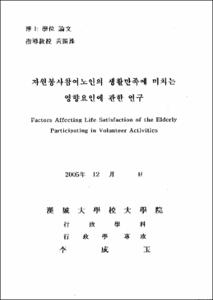자원봉사참여노인의 생활만족에 미치는 영향요인에 관한 연구
- Files in This Item:
-
-
Download
 000000557009.pdf
기타 데이터 / 6.68 MB / Adobe PDF
000000557009.pdf
기타 데이터 / 6.68 MB / Adobe PDF
-
Items in Repository are protected by copyright, with all rights reserved, unless otherwise indicated.
 000000557009.pdf
기타 데이터 / 6.68 MB / Adobe PDF
000000557009.pdf
기타 데이터 / 6.68 MB / Adobe PDFItems in Repository are protected by copyright, with all rights reserved, unless otherwise indicated.